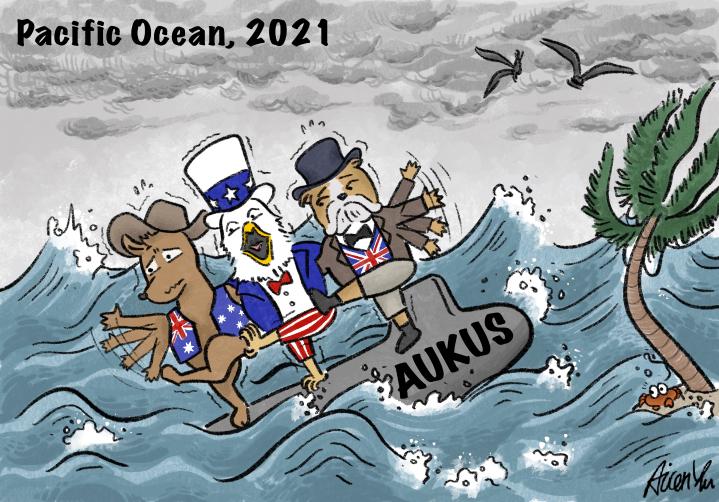AUKUS security partnership undermines regional stability -- military analyst

Cartoon: The show mustn't go on (Xinhua)
Washington and London's decision to help Australia build nuclear submarine capabilities could "intensify major power competition" in the region, an analyst said.
MANILA, Sept. 23 (Xinhua) -- Australia's move to establish an enhanced trilateral security partnership with the United States and Britain undermines the region's goal of maintaining a nuclear-free zone, an analyst has said.
The new partnership, also known as AUKUS, "is creating security anxieties" in the Asia and Pacific region and "putting many countries like the Philippines in guessing game scenarios," said Rommel Banlaoi, chairman of the Philippine Institute for Peace, Violence and Terrorism Research, told Xinhua in a recent interview.
"It's a serious concern for Southeast Asian countries because the plan of these three powers will run counter to the two major principles enshrined in various ASEAN declarations," Banlaoi said.
He referred to the documents of the Zone of Peace, Freedom and Neutrality signed in 1971 and the Southeast Asia Nuclear-Weapon-Free Zone in 1995, saying the two major declarations will be affected by the new security arrangement.
Banlaoi warned that Washington and London's decision to help Australia build nuclear submarine capabilities could "intensify major power competition" in the region.
Aside from the 10-member Association of Southeast Asian Nations (ASEAN), Banlaoi said Australia also faces a problem with its immediate neighbor New Zealand, because of that country's "very strong position on nuclear weapons-free principle."
"It's really problematic for Australia to enter into such kind of submarine development and at the same time adhering to the non-proliferation treaty," Banlaoi said, warning "Australia will be in a very odd, difficult position if it pursues (the plan)."
"It will have strategic implications and economic effects," the analyst added.
Banlaoi said Southeast Asia "will continue to reaffirm its long-standing position of making ASEAN a central figure in maintaining peace and stability in the region."
"ASEAN countries want to be part of the mechanism to open dialogues to remove these security uncertainties," Banlaoi said, noting that Southeast Asian countries do not want the region to be the "central arena" and "playground" of competition between major powers.
Photos
 Bumper harvest presents a magnificent scene of terraced rice paddies in SW China's Luzhou city
Bumper harvest presents a magnificent scene of terraced rice paddies in SW China's Luzhou city In pics: life of Siberian tigers in NE China's breeding center
In pics: life of Siberian tigers in NE China's breeding center Explore wonderland created by an alpine lake cluster in SW China's Yunnan
Explore wonderland created by an alpine lake cluster in SW China's Yunnan In pics: Museums across China unveil creative and culturally-inspired mooncakes
In pics: Museums across China unveil creative and culturally-inspired mooncakes
Related Stories
- U.S. special envoy for Haiti resigns citing "inhumane" treatment of migrants
- Biden administration prepares for possible gov't shutdown
- Gunman commits suicide after killing 1, injuring at least 12 in shooting rampage in Tennessee
- U.S. New Orleans unveils 20 mln USD emergency sanitation plan amid trash crisis
- Founder of French smart card giant reveals U.S. hegemony in tech sector
Copyright © 2021 People's Daily Online. All Rights Reserved.






